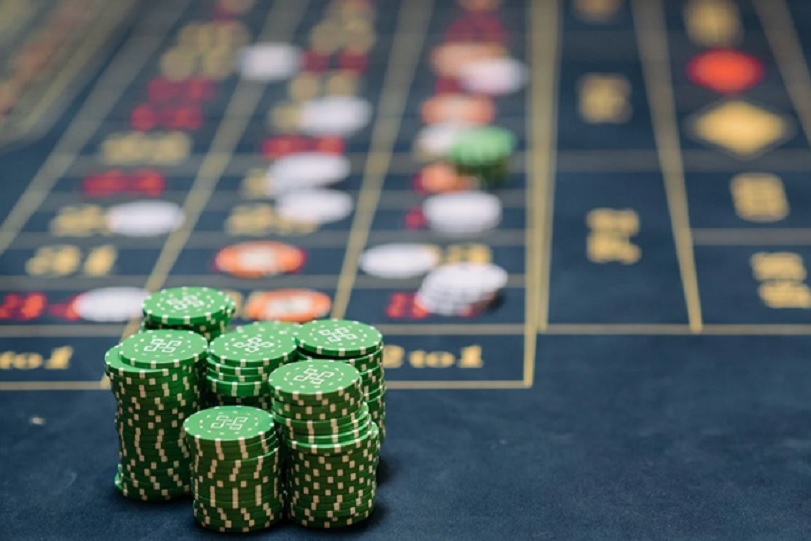Sports
Unlocking the Secrets of Roulette through Statistical Analysis

Roulette, a timeless casino game with a rich history spanning centuries, continues to captivate the attention of gamblers worldwide. Contrary to the common perception of it being merely a game of chance, roulette, in the Australian version of Roulette77, conceals a sophisticated world of statistical intricacies behind its spinning wheel and the mesmerizing trajectory of the bouncing ball.
This enduring game, which traces its origins back to 18th-century France, has evolved into a fascinating fusion of entertainment and mathematics. In the course of this article, our aim is to demystify roulette by unraveling the intricacies of statistical analysis, offering a comprehensive and clear exploration into the underlying patterns and probabilities that govern this iconic casino pastime.
By stripping away the often exaggerated glamour associated with roulette, we will embark on a journey that sheds light on the game’s mathematical foundations, allowing for a simple and formal comprehension of its dynamics.
Understanding the Basics of Roulette
Before we dive into the statistical intricacies, let’s establish a solid foundation of how roulette works. This Roulette77.in game revolves around a spinning wheel with numbered and colored pockets. The objective is to predict where the ball will land once the wheel comes to a halt. Players can place bets on specific numbers, colors, or ranges of numbers.
The Role of Probability
At its core, roulette is a game of probability. Every spin of the wheel is an independent event, meaning that the outcome of one spin does not influence the outcome of the next. The key to unraveling the mysteries of roulette lies in understanding the statistical probabilities associated with each type of bet.
Straight Bets
A straight bet on a single number may seem like a shot in the dark, but statistically, it carries a 1 in 37 (in European Roulette) or 1 in 38 (in American Roulette) chance of success. These odds are based on the number of pockets on the wheel.
Red or Black
The simplest bets in roulette involve choosing whether the ball will land on a red or black pocket. With 18 red and 18 black pockets (excluding the green zero), the probability of winning such a bet is close to 50%.
Even or Odd
Similar to the red or black bet, wagering on whether the ball will land on an even or odd number provides nearly a 50% chance of winning.
Statistical Analysis in Practice
Now that we’ve established the groundwork, let’s explore how statistical analysis comes into play. One common strategy is the Martingale System, where players double their bet after each loss. While this approach may seem foolproof, it’s essential to acknowledge its limitations. In reality, no betting system can alter the fundamental odds of the game.
In the world of statistics, variance and expected value play pivotal roles. Variance measures how far a set of numbers are spread out from their average, while the expected value represents the average outcome of a series of similar events.
In roulette, understanding the variance of different bets helps players manage their bankroll. Bets with higher variance, such as straight bets, can lead to significant wins or losses, making them riskier. On the other hand, bets with lower variance, like even or odd, provide a steadier, albeit smaller, stream of wins.
In the fast-paced world of casinos, where excitement and uncertainty often reign supreme, adopting a calculated approach to roulette can be a game-changer. By embracing statistical analysis, players can make informed decisions and navigate the roulette table with a clearer understanding of the underlying probabilities.
In essence, roulette is not merely a wheel of chance; it is a mathematical playground where statistics come to life. As we’ve explored the basics of probability, the Martingale System, and the significance of variance and expected value, it becomes evident that a simple and formal understanding of statistical concepts can empower players in their quest for success.
So, the next time you find yourself at the roulette table, remember that behind the spinning wheel and the bouncing ball lies a world of numbers and probabilities waiting to be deciphered. With a calculated approach and a basic understanding of statistical analysis, you can elevate your roulette experience from a game of chance to a strategic pursuit of favorable odds.
Sports
FIFA Picks Saudi Arabia to Host 2034 World Cup

By Adedapo Adesanya
Saudi Arabia has been confirmed as the host nation for the 2034 FIFA World Cup.
Also confirmed were the hosts for the 2030 World Cup, which was awarded to six countries and will take place across three continents to celebrate 100 years of the tournament.
Saudi Arabia was the sole bidder for the 2034 competition. Its host status was confirmed on Wednesday after an online meeting of the 211 members of the International Federation of Association Football (FIFA).
The members confirmed the unchallenged bids by acclamation – simply clapping during the virtual meeting led by FIFA president, Mr Gianni Infantino.
As well as the World Cup, Saudi Arabia is hosting football’s 2027 Asian Cup, the 2029 Asian Winter Games and the 2034 Asian Games. It also has long-term ambitions to host more major events, including the Women’s World Cup.
The 2030 tournament will be led by co-hosts Spain and Portugal in Europe, and Morocco in North Africa. Uruguay, Paraguay and Argentina will each hold an opening match to mark 100 years since the first World Cup took place in Uruguay in 1930, a tournament that the South American nation won.
The next World Cup in 2026 will be co-hosted by three proximal nations in North America— the US, Canada, and Mexico.
Saudi Arabia first published its bid for the World Cup back in August 2024 after FIFA controversially fast-tracked the process for hosting the tournaments in 2030 and 2034.
The bid for the 2034 tournament has led to criticism from activist groups, who argue that Saudi laws will not protect workers overseas.
Some of the issues echoed that of the 2022 tournament held in Qatar.
The tournament will require the construction of eight new stadiums, for a total of 15 hosting venues, plus the addition of 175,000 hotel rooms, which will rely heavily on migrant labour.
Critics of FIFA also insist a Saudi-based World Cup risks a repeat of the rights abuses seen during a decade of similar preparations for the 2022 World Cup in Qatar.
FIFA previously praised the Saudi bid in an in-house evaluation, noting that the 48-team, 104-game tournament offers “significant opportunities for positive human rights impact”.
However, it added that Saudi Arabia must invest “significant effort and time” to comply with international standards.
Sports
Brila FM Suspends Operations in Port Harcourt, Abuja Over N200m Fraud

By Aduragbemi Omiyale
Leading sports radio station in Nigeria, Brila FM, owned by a veteran sports journalist, Mr Larry Izamoje, has suspended its operations in Abuja and Port Harcourt in Rivers State.
The broadcast stations in these two prominent cities of the country are currently not on air as a result of the directive of Mr Izamoje.
He took the action after uncovering fraudulent activities by employees of the company.
It was alleged that Brila FM’s Head of the Port Harcourt branch, Mr Sam Victor Mpong Akakan, has not been remitting funds to the company’s account.
In a statement made available to Business Post, it was stated that Mr Akakan has been arrested by the police in connection with the issue alongside the organisation’s former Chief Accountant, Mr Ekerete Sunday.
Mr Akakan was accused of opening a company, Bricast Communications, only two months after Brila FM Port Harcourt began operations with him as the Head of Station.
It was claimed that he took the first three letters of Brila and the word ‘CAST’ from ‘BroadCASTing’ to register his business name, which he allegedly used to issue invoices meant for Brila FM.
It was said that in connivance with others, Mr Akakan issued several Bricast Communications invoices with Bricast account details to several Brila FM clients instead of the company’s invoice bearing Brila Broadcasting Services Ltd for the diversion of payments for adverts and sponsored programmes aired on Brila FM stations in Abuja and Port Harcourt particularly.
He is also being investigated for forging certificates of broadcasts of Brila FM, tendering the same to clients using his Bricast invoices and getting payments into his Bricast account from such activities.
Mr Akakan was said to have presented himself on several occasions to unsuspecting clients including churches as Brila FM’s marketer and once convinced to do business on Brila FM gave them Bricast invoices for payments to his company (Bricast) repeatedly.
It was claimed that a fraud case involving over N200 million led to the temporary suspension of the Abuja and Port Harcourt branches.
Sports
Analysis Reveals Wilfried Zaha as Africa’s Most Handsome Athlete for 2024

By Dipo Olowookere
An analysis has shown that an Ivorian footballer, Wilfried Zaha, is the most handsome African sportsperson in 2024.
Zaha, who opted to play for Cote d’Ivoire after the Three Lions of England snubbed by him, currently plies his trade in Turkey for Galatasaray.
He moved to Turkey from England, where he played for Crystal Palace, and was one of the stars of the football outfit.
In research conducted by Bettors, Zaha topped the list as the most attractive African male athlete of 2024, closely followed by Odion Ighalo, a former Nigerian striker, and Akani Simbine, a South African sprinter.
The Most Handsome African Athletes of 2024 rankings used the golden ratio as a benchmark for facial attractiveness.
This study carefully analysed high-quality images of athletes from various sports, offering a fresh perspective on their aesthetic appeal.
The methodology involved selecting three high-quality images per athlete, sourced from official sports archives, media outlets, and verified athlete profiles, ensuring accuracy and clarity, according to the results of the research made available to Business Post.
Fourth on the list is Alex Iwobi of Nigeria, who plays for Fulham FC in England, and a Tanzanian footballer with Greece’s PAOK, Ally Samatta, is the fifth Most Handsome Athlete in Africa.
Ghana and Arsenal’s midfielder, Thomas Partey, is sixth, Senegalese Kalidou Koulibaly is seventh, Pierre-Emerick Aubameyang of Garbon is eight, Ivorian Cheick Sallah-Cisse is ninth and Senegalese Reug Reug is number 10 on the list.
-

 Feature/OPED5 years ago
Feature/OPED5 years agoDavos was Different this year
-
Travel/Tourism8 years ago
Lagos Seals Western Lodge Hotel In Ikorodu
-

 Showbiz2 years ago
Showbiz2 years agoEstranged Lover Releases Videos of Empress Njamah Bathing
-

 Banking6 years ago
Banking6 years agoSort Codes of GTBank Branches in Nigeria
-

 Economy2 years ago
Economy2 years agoSubsidy Removal: CNG at N130 Per Litre Cheaper Than Petrol—IPMAN
-

 Banking2 years ago
Banking2 years agoFirst Bank Announces Planned Downtime
-

 Sports2 years ago
Sports2 years agoHighest Paid Nigerian Footballer – How Much Do Nigerian Footballers Earn
-

 Technology4 years ago
Technology4 years agoHow To Link Your MTN, Airtel, Glo, 9mobile Lines to NIN












